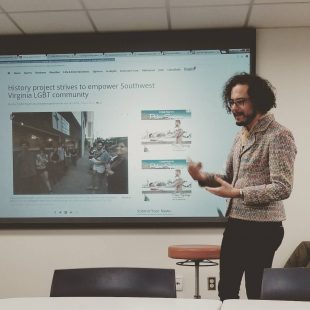When Dr. Gregory Rosenthal, Assistant Professor of Public History at Roanoke College, arrived in Roanoke in 2015, they wondered how they fit in with the distinct culture of Southwest Virginia. Transported from New York City, they embarked on a journey of public history research and community interaction through the Southwest Virginia LGBTQ+ History Project, a community-based history initiative committed to researching and telling the stories of LGBTQ+ individuals and organizations in the region. They founded this project with self-taught digital tools to engage queer audiences and encourage people to think about the queer past in new ways.

Assembling a collection of gay newspapers, such as The Virginia Gayzette, and other artifacts relating to local LGBTQ+ history found tucked away in attics and forgotten in shoeboxes of local people, Rosenthal and the members of the Southwest Virginia LGBTQ+ History Project built a physical archive of historical materials that were not otherwise preserved in regional museums or libraries. The LGBTQ+ History Collection is housed at the Virginia Room in the Roanoke Public Library and available for public access. Some highlights of the collection are available online.
Through this research, a map of gay bars in downtown Roanoke from 1978 was found, and the queer bar crawls were born. In their talk, Rosenthal spoke about how during these bar crawls, the members of the Southwest Virginia LGBQ+ History Project and other history-loving bar-goers visit the sites of old gay bars, read the words of people who went to them when they existed, and listen to what they were like in their heyday. While the queer bar crawls do not occur online and have little to do with digital tools, they highlight the significance of the physical spaces of LGBTQ+ individuals.
One of the goals of the Southwest Virginia LGBTQ+ History Project is reclaiming historically queer spaces that are no longer queer, which involves doing the physical work that is at the heart of the project, like organizing the queer bar crawls and walking tours of downtown Roanoke. The advent of the internet in some ways destroyed queer spaces as LGBTQ+ people today meet and socialize via the internet rather than in gay bars or gay bookstores, which in the past created ways for queer people to find each other and engage in social experiences. Although it demolished queer spaces in the past, digital technology can be used to draw attention to and reclaim queer spaces. Through Audacity to record the voices of LGBTQ+ individuals telling their experiences and SoundCloud to embed these recordings into an online exhibit, Rosenthal created the exhibit “Coming Out: Gay Liberation in Roanoke, Virginia, 1966-1980,” which is an accessible and engaging mode of communicating the unedited, raw oral histories of gay liberation and queer history in Roanoke.
As these social experiences move online and gay culture becomes mainstreamed, are these physical spaces needed anymore? Rosenthal believes they are. It is still a struggle to be queer in public, and claiming these spaces encourages “coming out of the closet and into the streets.” Through the efforts of the Southwest Virginia LGBTQ+ History Project, a community of LGBTQ+ people forms both in physical space and online, which is the central goal of the project–aside from inspiring people to “Make Roanoke Queer Again.”
-Jenny Bagger, DH Undergraduate Fellow
This event was made possible by a grant from the Andrew W. Mellon Foundation. It was co-sponsored by the Washington and Lee History Department.